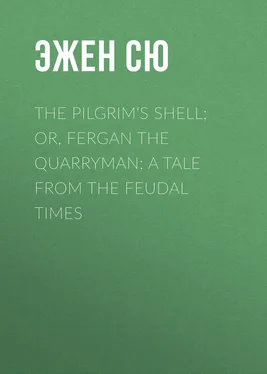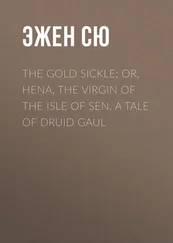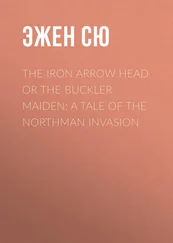Эжен Сю - The Pilgrim's Shell; Or, Fergan the Quarryman - A Tale from the Feudal Times
Здесь есть возможность читать онлайн «Эжен Сю - The Pilgrim's Shell; Or, Fergan the Quarryman - A Tale from the Feudal Times» — ознакомительный отрывок электронной книги совершенно бесплатно, а после прочтения отрывка купить полную версию. В некоторых случаях можно слушать аудио, скачать через торрент в формате fb2 и присутствует краткое содержание. Издательство: Иностранный паблик, Жанр: literature_19, foreign_antique, foreign_prose, на английском языке. Описание произведения, (предисловие) а так же отзывы посетителей доступны на портале библиотеки ЛибКат.
- Название:The Pilgrim's Shell; Or, Fergan the Quarryman: A Tale from the Feudal Times
- Автор:
- Издательство:Иностранный паблик
- Жанр:
- Год:неизвестен
- ISBN:нет данных
- Рейтинг книги:3 / 5. Голосов: 1
-
Избранное:Добавить в избранное
- Отзывы:
-
Ваша оценка:
- 60
- 1
- 2
- 3
- 4
- 5
The Pilgrim's Shell; Or, Fergan the Quarryman: A Tale from the Feudal Times: краткое содержание, описание и аннотация
Предлагаем к чтению аннотацию, описание, краткое содержание или предисловие (зависит от того, что написал сам автор книги «The Pilgrim's Shell; Or, Fergan the Quarryman: A Tale from the Feudal Times»). Если вы не нашли необходимую информацию о книге — напишите в комментариях, мы постараемся отыскать её.
The Pilgrim's Shell; Or, Fergan the Quarryman: A Tale from the Feudal Times — читать онлайн ознакомительный отрывок
Ниже представлен текст книги, разбитый по страницам. Система сохранения места последней прочитанной страницы, позволяет с удобством читать онлайн бесплатно книгу «The Pilgrim's Shell; Or, Fergan the Quarryman: A Tale from the Feudal Times», без необходимости каждый раз заново искать на чём Вы остановились. Поставьте закладку, и сможете в любой момент перейти на страницу, на которой закончили чтение.
Интервал:
Закладка:
"Nothing," answered the serf in despair, throwing down his pick and hammer; "nothing, nothing!"
Joan fell back upon the stone sobbing. She raised her hands to heaven and murmured: "I shall never again see Colombaik! My poor child is lost for ever!"
Fergan, no less distressed than his wife, sat down on another stone placed near the fire-place, his elbows on his knees, his chin in his hands. Thus he remained for a long spell, gloomy, silent. Suddenly rising, he started to walk uneasily, muttering in a muffled voice: "That cannot remain so – I shall go – Yes, I shall! I must find him!"
Joan, hearing the serf repeat: "I shall go! I shall go!" raised her head, wiped her tears with the back of her hand and asked: "Where is it you want to go?"
"To the castle!" roared the serf, continuing his agitated walk, his arms crossed over his chest. Trembling from head to foot, Joan clasped her hands, and tried to speak. In her terror, she could not at first utter a word; her teeth chattered. At last she said in a faint voice: "Fergan – you must have lost your wits when you say you will go to the castle."
"I shall go after the moon has set."
"Oh! I have lost my poor child," rejoined Joan moaning, "I am going to lose my husband also." She moaned again. The imprecations and the foot-falls of the serf alone interrupted the silence of the night. The fire went out in the fire-place, but the moon, just risen, threw her pale rays into the interior of the hut through the open spaces left by the pole and bunches of brush that took the place of the burnt-out roof. The silence lasted long. Joan the Hunchback taking courage anew, resumed in an accent that was almost confident: "You propose to go to-night – to the castle – fortunately that's impossible." And seeing that the serf did not intermit his silent walk, Joan took his hand as he moved toward her: "Why do you not answer? That frightens me." He roughly withdrew his hand, and thrusting his wife back, exclaimed in an irritated voice: "Leave me alone, woman, leave me alone."
The feeble creature fell down a few steps beyond among some rubbish, and her head having struck against a piece of wood, she could not hold back a cry of pain. Fergan walked back, and by the light of the moon he saw Joan rising painfully. He ran to her, helped her to sit down on one of the stones of the fire-place, and asked anxiously: "Did you hurt yourself falling?"
"No, no, my dear husband."
"My poor Joan!" exclaimed the serf alarmed, having placed one of his hands on the forehead of his wife, "you bleed!"
"I have been weeping," she replied sweetly, staunching her wound with a lock of her long disheveled hair.
"You suffer? Answer me, dear wife!"
"No, no, I fell because I am feeble," answered Joan with her angelic mildness; "let's not think about that," and she added, smiling sadly and alluding to her deformity, "I need not fear being made ugly by a scar."
Fergan imagined that Joan the Hunchback meant he would have treated her with less rudeness if she had been handsome, and he felt deeply grieved. In a tone of kind reproach he replied: "Apart from the hastiness of my temper, have I not always treated you as the best of wives?"
"That's true, my dear Fergan, and my gratitude is great."
"Have I not freely taken you for wife?"
"Yes, notwithstanding you could have chosen from the serfs of the seigniory a companion who would not have been deformed."
"Joan," replied the quarryman with sad bitterness, "if your countenance had been as beautiful as your heart is good, whose would have been the first night of our wedding? Would it not have belonged to Neroweg 'Worse than a Wolf,' or to one of his whelps?"
"Oh, Fergan, my ugliness saved us this supreme shame."
"The wife of Sylvest, one of my ancestors, a poor slave of the Romans, also escaped dishonor by disfiguring herself," was the thought that flashed through the quarryman's mind while he sighed, and pondered: "Oh, slavery and serfdom weigh upon our race for centuries. Will the day of deliverance, predicted by Victoria the Great, 1 1 A Gallic heroine of the second century.
ever come."
Joan, seeing her husband plunged in meditation, said to him: "Fergan, do you remember what Pierrine the Goat told us three days ago on the subject of our son? She had, as was her custom, led her sheep to the steepest heights of the great ravine, whence she saw one of the knights of the Count of Plouernel rush on a gallop out of a copse where our little Colombaik had gone to gather some dead wood. Pierrine was of the opinion that that knight carried off our child under his cloak."
"The suspicions of Pierrine were well founded."
"Good God! What is it you say?"
"A few hours ago, while I was at the quarry, several serfs, engaged in repairing the road of the castle which was partly destroyed during the last war, came for stone. For the last three days I have been like crazy. I have been telling everybody of the disappearance of Colombaik. I spoke about it to these serfs. One of them claimed to have seen the other evening, shortly before nightfall, a knight holding on his horse a child about seven or eight years, with blonde hair – "
"Unhappy we! That was Colombaik."
"The knight then climbed the hill that leads to the manor of Plouernel, and went in."
"But what can they do to our child?"
"What will they do!" exclaimed the serf shivering, "they'll strangle him, and use his blood for some infernal philter. There is a sorceress stopping at the castle."
Joan uttered a cry of fright, but rage swiftly followed upon her fright. Delirious and running to the door she cried out: "Fergan, let's go to the manor – we shall enter even if we have to tear up the stones with our nails – I shall have my child – the sorceress shall not throttle him – no! no!" The serf, holding her by the arm, drew her back. Almost immediately she fainted away in his arms. Still, in a muffled voice, the poor woman muttered: "It seems to me I see him die – if my heart were torn in a vice I could not suffer more – it is too late – the sorceress will have strangled the child – no – who knows!" Presently seizing her husband by the hand, "You meant to go to the castle – come – come!"
"I shall go alone when the moon is down."
"Oh, we are crazy, my poor man! Pain leads us astray. How can one penetrate into the lair of the count?"
"By a secret entrance."
"And who has informed you of it?"
"My grandfather Den-Brao accompanied his father Yvon the Forester in Anjou during the great famine in 1033. Den-Brao, a skillful mason, after having worked for more than a year in the castle of a lord of Anjou became his serf, and was exchanged by his master for an armorer of Neroweg IV, an ancestor of the present lord. My grandfather, now a serf of the lord of Plouernel, was engaged in the construction of a donjon which was attached to the castle. The work lasted many a year. My father, Nominoe, almost a child at the commencement of the structure, had grown to manhood when it was finished. He helped his father in his work, and became a mason himself. After his day's work, my grandfather used to trace upon a parchment the plan of the several parts of the donjon which he was to execute. One day my father asked him the explanation of certain structures, the purpose of which he could not understand. 'These separate stone works, connected by the work of the carpenter and the blacksmith,' answered my grandfather, 'will constitute a secret staircase made through the thick of the wall of the donjon, and it will ascend from the lowest depth of this edifice to the top, while it furnishes access to several reducts otherwise invisible. Thanks to this secret issue, the Lord of Plouernel, if besieged in his castle, and unable to resist his enemies, will be able to escape, and reach a long subterraneous gallery which comes out at the rocks that stretch to the north, at the foot of the mountain, where the seigniorial manor-house rises.' Indeed, Joan, during those days of continual wars, similar works were executed in all the strongholds: their owners always looked to preserving the means of escape from their enemies. About six months before the completion of the donjon, and when all that was left to do was the construction of the staircase and the secret issue, traced upon the plan of my grandfather, my father broke both of his legs by the fall of an enormous stone. That grave accident became the cause of a great piece of good fortune."
Читать дальшеИнтервал:
Закладка:
Похожие книги на «The Pilgrim's Shell; Or, Fergan the Quarryman: A Tale from the Feudal Times»
Представляем Вашему вниманию похожие книги на «The Pilgrim's Shell; Or, Fergan the Quarryman: A Tale from the Feudal Times» списком для выбора. Мы отобрали схожую по названию и смыслу литературу в надежде предоставить читателям больше вариантов отыскать новые, интересные, ещё непрочитанные произведения.
Обсуждение, отзывы о книге «The Pilgrim's Shell; Or, Fergan the Quarryman: A Tale from the Feudal Times» и просто собственные мнения читателей. Оставьте ваши комментарии, напишите, что Вы думаете о произведении, его смысле или главных героях. Укажите что конкретно понравилось, а что нет, и почему Вы так считаете.












